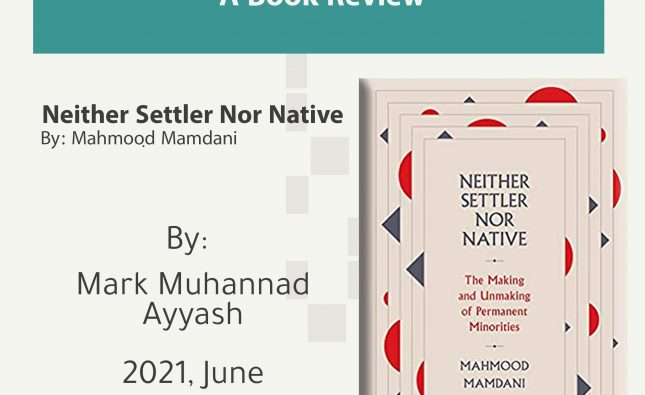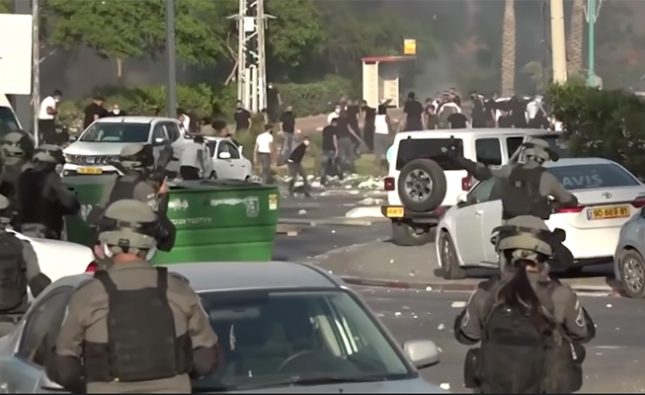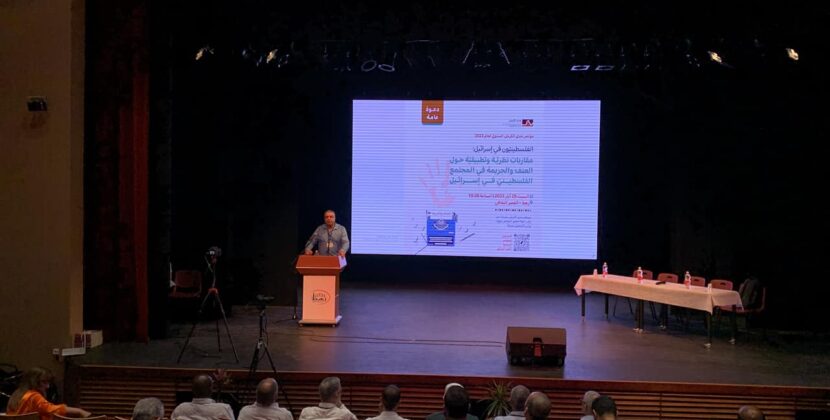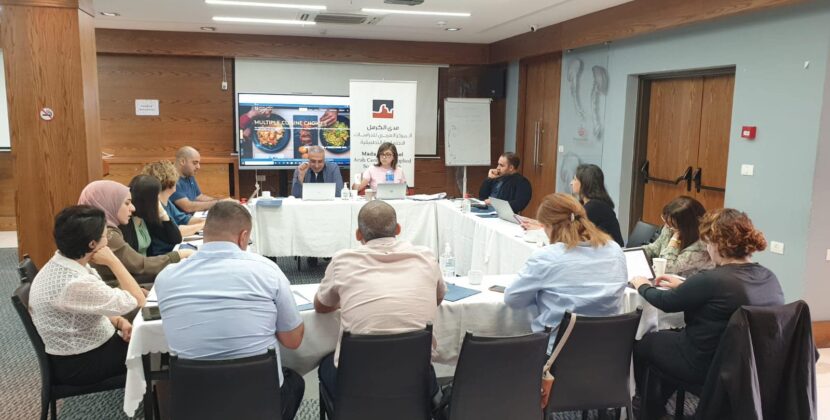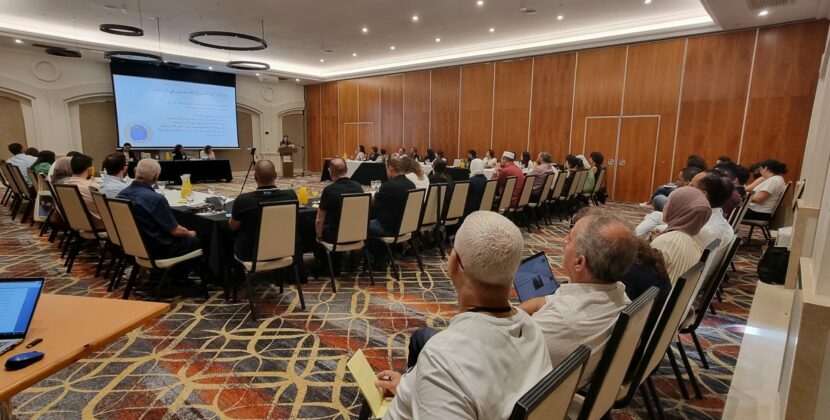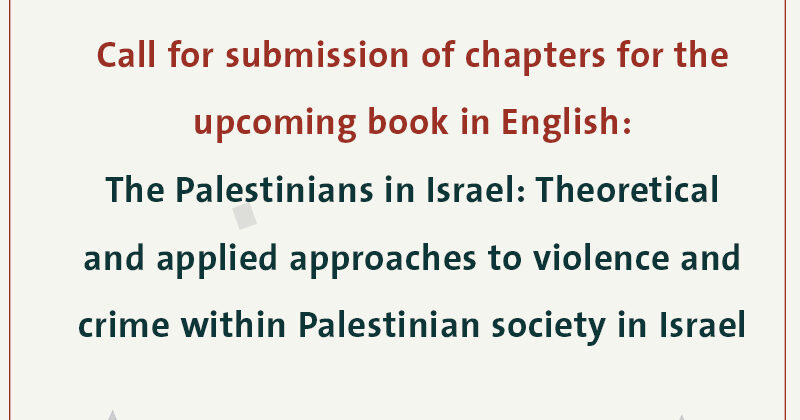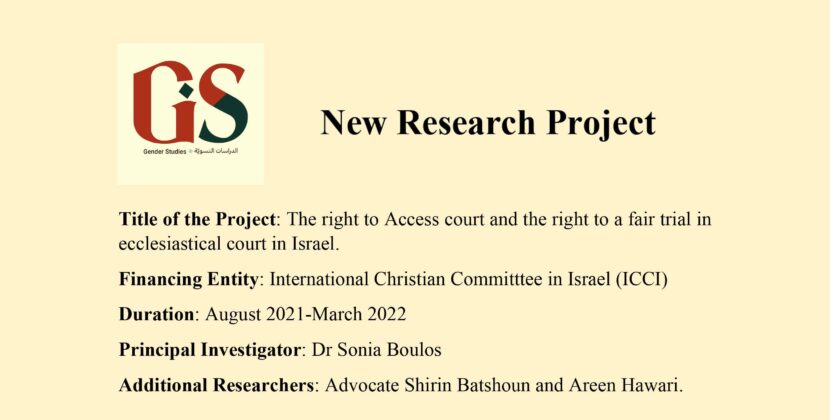On 24-25 July 2015, Mada al-Carmel — Arab Center for Applied Social Research hosted an academic workshop on Zionism and settler-colonialism at the Grand Park Hotel in Ramallah. This workshop, run by Mada General Director Professor Nadim Rouhana, was the first of six training and research events to be held on Zionism and settler-colonialism for Palestinian graduate students and recent post-doctorates. The workshop took place as part of Mada’s PhD Program, a project launched in January 2015 aiming to help develop the next generation of critical Palestinian scholars by creating a space for Palestinian PhD students and postgraduates to share their ideas, advance their work, and receive feedback from experts in their respective fields.
 Professor Nadim Rouhana opened the workshop with a lecture presenting initial questions and observations on Zionism and settler-colonialism. He remarked that the Palestinian national movement viewed the Zionist project as a colonial project on a political and intellectual level from its outset, but at a certain stage, particularly after 1971, the terms of debate gradually shifted from anti-colonial liberation to statehood and sovereignty. The dominant Palestinian leadership, operating in complex circumstances in both the Arab world and internationally, played a role in this shift. However, he added that Palestinians, internationals, and even anti-Zionist Israeli researchers are returning to the framework of settler-colonialism today. Rouhana also offered an explanation of what distinguishes settler-colonialism from colonialism in general. Classical colonialism involves the exercise of economic, political, and military control and improves the geopolitical situation of the colonizer through the subjugation of the colonized, operating remotely through local agents; settler colonialism, on the other hand, aims to create its own political entity and settle the land as its new homeland, maintaining the same standard of living as in the metropole. He noted that while the logic of colonialism depends on subjugation, the logic of settler colonialism depends on the replacement of the indigenous population. Settler-colonialism does not intend to rule the “natives,” but to take their place without recognizing it as the homeland of its indigenous residents. Rouhana then identified various features of settler colonialism, arguing that they are fully consistent with the Zionist project. These features include:
Professor Nadim Rouhana opened the workshop with a lecture presenting initial questions and observations on Zionism and settler-colonialism. He remarked that the Palestinian national movement viewed the Zionist project as a colonial project on a political and intellectual level from its outset, but at a certain stage, particularly after 1971, the terms of debate gradually shifted from anti-colonial liberation to statehood and sovereignty. The dominant Palestinian leadership, operating in complex circumstances in both the Arab world and internationally, played a role in this shift. However, he added that Palestinians, internationals, and even anti-Zionist Israeli researchers are returning to the framework of settler-colonialism today. Rouhana also offered an explanation of what distinguishes settler-colonialism from colonialism in general. Classical colonialism involves the exercise of economic, political, and military control and improves the geopolitical situation of the colonizer through the subjugation of the colonized, operating remotely through local agents; settler colonialism, on the other hand, aims to create its own political entity and settle the land as its new homeland, maintaining the same standard of living as in the metropole. He noted that while the logic of colonialism depends on subjugation, the logic of settler colonialism depends on the replacement of the indigenous population. Settler-colonialism does not intend to rule the “natives,” but to take their place without recognizing it as the homeland of its indigenous residents. Rouhana then identified various features of settler colonialism, arguing that they are fully consistent with the Zionist project. These features include:
1. Dispossession of land and space, creation of a new geography and history beginning from the date of the colonizer’s arrival, and receipt of support and legitimacy from the academic sphere.
2. The elimination of the indigenous population: initially through massacres and later through various other means.
3. Structural violence – in which violence is not an event, but a continuous process occurring in the political, legal and cultural spheres. However, colonialism does not see itself as violent, but ruthlessly uses violence which is justified as a means of defending its land.
4. A logic of justification distinct from that of colonialism, which justified its existence by bringing development and urbanization to the colonized. Settler colonialism uses other justifications, such as divine right and arrival into a virgin land.
Rouhana added that each instance of settler-colonialism is accompanied by a permanent state of fear as a result of acts of violence that were committed throughout its history.
Rouhana argued that settler-colonial projects could result in “victory”, through the total or near-total elimination of the indigenous population (as in the cases of Canada and New Zealand), or “defeat”, through either reconciliation (as in the case of South Africa) or expulsion and the return of the settler to his/her country (as in the case of Algeria).
Rouhana then attempted to consider where the Zionist project stands, pointing out three things that distinguish it from other settler-colonial projects:
1. The Zionist project is ongoing.
2. The Zionist movement is also a nationalist movement and has succeeded in building a nation.
3. The Zionist project is grounded in religious justifications that are different from the justifications given for other settler-colonial projects. Religious justifications were not only used during the establishment of the project in its infancy, but remain salient today and are growing in importance.
In the second session, researchers and students discussed Zionism from a settler-colonial perspective. Participants raised a number of questions, including: What is our position as Palestinians in relation to victorious settlement projects? How do we define the Zionist project’s defeat? Would the removal of the state’s colonial nature and its conversion to a state for all its citizens be considered a victory? Participants also discussed the phenomenon of mental or epistemological colonization, debating whether it could be applied to the Palestinian case. Moreover, researchers and students considered the significance of the colonizer’s increasing violence and racism as a manifestation of force or fear, particularly in the Zionist case. They noted the possible role of a joint Palestinian and Mizrahi Jewish movement in resisting the Zionist project. Additional proposals were put forward on the need to consider security and military studies in order to understand the relationship between violence and the colonial project; the production of fear in the colonial project, which is necessary for its survival; and the colonizer’s success in producing forms of Palestinian subjectivity that are not conducive to resisting Zionism.
The second lecture was given by Dr. Munir Fakher Eldin, a lecturer at Birzeit University. He reviewed Palestinian historical readings of the Zionist project, considering how the analytical framework of settler-colonialism could be used productively by researchers and historians. During his lecture, he emphasized the importance of reconsidering the study of British colonialism, which established institutions and practices that formed a precursor for Zionism. By examining the case of the Bisan (Beit Shean) valley, however, he argued that the dynamics of the relationship between British colonialism and Zionism are complex, and cannot be reduced to the fact that British colonialism enabled Zionist expropriation through land laws. He ultimately contended that British colonialism should not be reduced solely to an enabler of Zionism. Fakher Eldin added that three explanatory frameworks have been used to consider the history of Palestine—the clash of civilizations (which implies a conflict between Palestinians and Jews); the framework of modern national civil society; and settler-colonialism—arguing that Palestinian academia is in conflict between the first and second paradigms.
The second day began with a lecture by Dr. Abdul Rahim Sheikh of Birzeit University. In this lecture, he presented a critical intervention entitled “Towards a liberal approach in Palestinian cultural studies,” arguing that in the local Palestinian epistemological context, there is no specialized field of “Palestinian cultural studies” situated within the colonial setting, but noting that there have been many attempts to create such a field. Accordingly, his intervention sought to provide a theoretical introduction to the field, its limits and conceptual problems, and the possibilities of using critical contemplation of the experience of the colonized to inaugurate methods that are free from colonial influence, in light of the lapse between the theoretical and the applied as witnessed in Palestine today. The intervention consisted of four segments. In the first segment, Dr. Sheikh presented a series of methodological questions on how cultural studies can serve us in developing better academic approaches to Zionism. In the second segment, he presented a cultural theoretical reading of the emergence of Zionism in a colonial context and the status of the Abrahamic faiths within that context. In the third segment, he presented a cultural application of the theoretical intervention made in his upcoming book, “The Columbus Syndrome and the Exploration of Palestine: Zionist policies of naming and cultural engineering in Palestinian space,” to be published by the Institute for Palestine Studies at the end of 2015. In the last segment, he presented critical conclusions, a contemplation of the function of criticism, and criticism of criticism itself, noting that criticism can become merely a form of posturing in a post-colonial context.
 The second session, entitled “Daily life under settler-colonialism in Palestine,” was opened and moderated by Professor Nadera Shalhoub-Kevorkian, and also involved the participation of doctoral students Rami Salameh and Maysa Eshkirat.
The second session, entitled “Daily life under settler-colonialism in Palestine,” was opened and moderated by Professor Nadera Shalhoub-Kevorkian, and also involved the participation of doctoral students Rami Salameh and Maysa Eshkirat.
In her remarks, Shalhoub-Kevorkian argued that scholars under colonialism write about their lived experiences rather than theorizing abstractly. She noted that daily Israeli policies of colonialism are structural in nature rather than isolated events, and that these policies are attempts by the settlers to demand for themselves the status of the indigenous. She added that the theorizing of daily practices of intimidation is essential in understanding the Zionist colonial situation. She also spoke about Palestinian practices of maneuvering that challenge the violence of colonialism, such as smuggling the bodies of the dead, using alternative routes to avoid checkpoints and soldiers while going to school and returning home, etc.
Rami Salameh, a doctoral student at the Graduate Institute in Geneva, highlighted colonial policies that limit and restrict Palestinian freedom of movement, force Palestinians to undergo everyday practices of maneuvering in order to pass through checkpoints, and impose different spaces of movement on different groups of Palestinians. He noted that those who have a blue Israeli ID pass through a different checkpoint from those who have West Bank IDs, even in cases where two partners or a father and his children have different IDs. He added that it is difficult to analyze this context based on literature that refers either to hegemony or to resistance, arguing that states of command and control are also productive of subjectivities. This requires a review of space in a colonial context, where the colonial project has succeeded in producing various Palestinian subjectivities, distinguishing between Palestinians in Jerusalem, the West Bank and Israel on the basis of their ability to move from place to place, as restrictions on movement are inscribed onto the Palestinian body. He added that civil society also reproduces these colonial contradictions. In his research, Salameh is rewriting the history of colonial space through people’s stories by conducting an ethnographic study to examine and analyze how the colonized Palestinian maneuvers within this system.
The second intervention was made by Maysa Eshkirat, a doctoral student at SOAS in London. Eshkirat addressed the body and sexuality in light of daily Israeli policies of colonization. She noted that existing research does not adequately address the violence of the Zionist project – a colonial project aiming to expropriate all of historic Palestine and the Golan Heights. Eshkirat claimed that resistance to colonialism at the level of everyday life is absent from existing academic literature and argued that research should be part of the process of liberation in the Palestinian case. Eshkirat added that through her research, she aims to deconstruct or problematize the relationship between knowledge and colonialism. In the Zionist context, she noted that colonialism itself is imprinted onto the body of the Palestinian women in patriarchal terms. She ended her intervention by stating that what distinguishes Zionist colonialism from other cases of settler colonialism is that it faces strong resistance in spite of the fact that it represents the ultimate culmination of the European colonial mentality, delegitimizing the “other” and using quasi-religious justifications for its actions.
In the last session, each of the participants stated their future expectations from the workshop series, and the areas which they were interested in addressing in subsequent workshops. Participants proposed to consider the issue of indigeneity, the distinct articulations of settler colonialism in the 1967 and 1948 regions, and internal violence within the Palestinian community in the context of colonialism. Some participants also suggested inviting Jewish lecturers who oppose Zionist colonial thought.
At the end of the workshop, the group agreed to write research papers on the various issues that will be addressed in coming workshops.





